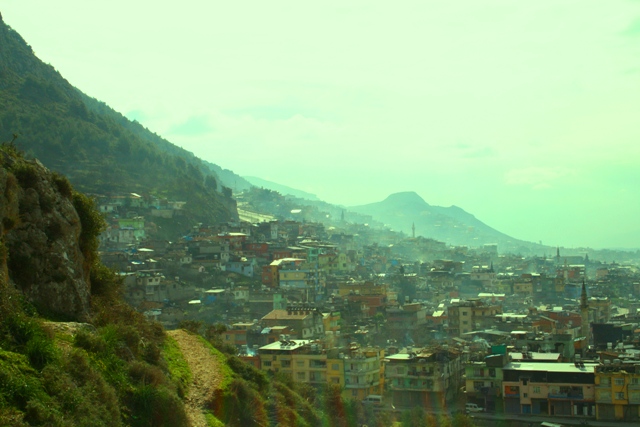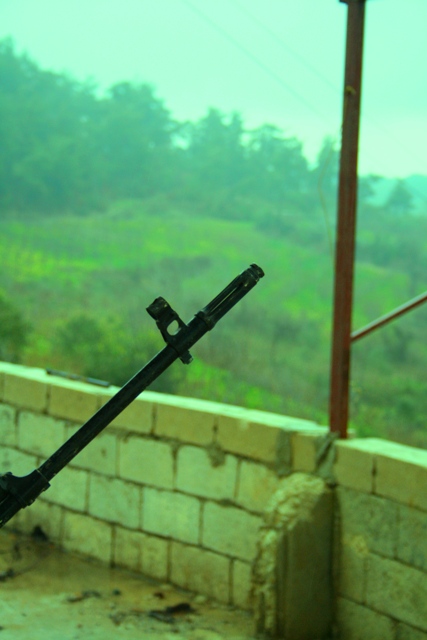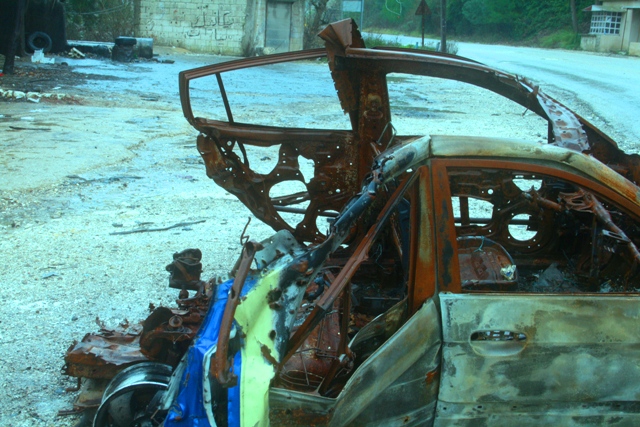Crossing into Syria to Take up the Fight
The article first appeared in the New Internationalist in Feb 2013.

* Ahmed looks out of place in Antakya. His walk still has traces of the London streets; the tattoo of his postcode is partially visible on his neck, even though he has tried his best to remove it. I am surprised that he’s even here, on the Turkish-Syrian border, and that he hasn’t been picked up by the security services. In fact, according to one of my sources, Syrian brigades are sending many foreigners back, because they are usually a liability. Over the following days I realize that Ahmed was born for this kind of work. He deals with stress well; he seems to thrive on it. ‘It’s the only thing I know well,’ he says. ‘I’ve been fighting all my life.’
Ahmed grew up on a council estate. He robbed, he fought, he looted and ‘banged up mans’. Ahmed had chosen his path by the time he was 15 and only a drunken brawl saved him. ‘In prison I had plenty of thinking time. I could read and learnt my deen [Islamic faith]. I started looking around me and I realized what I was missing.’
When Ahmed was released he stayed straight – most of the time. He admits he had some lapses, however. ‘I’m walking down the road and girls I know in my area are blowing me kisses – it’s hard, akhi [brother].’ Sometimes he even went back to selling drugs because he couldn’t make ends meet. ‘I even tried to get married and some convert girl is asking me if I was a money-manor a gun-man!’ It was a Jamaican carpenter who had converted to Islam who taught Ahmed the trade that allowed him to go straight. Stability allowed him to catch up with the world. ‘I read Malcolm X, [I read] anything and everything.’ He started to delve into history. ‘I noticed a trend. The West was bombing Iraq when they had put Saddam in power. They allowed Bosnia to get raped yet they are in Mali like a shot. Why? Afghanistan is the same story… you can’t rely on the West; you have to rely on yourself. All I’ve got is heart and knowing how to fight. Syria’s going to go the same way unless I do something about it. I don’t want to live my life thinking I should have done something when I could.’

Ahmed was echoing an interview I had had with Kemal*, a middle-aged professional in a suburban café in South London. ‘Yes, I went to Kandahar in the 1980s [to fight against the Soviets during their war with the Mujahedin in Afghanistan], and I don’t have any regrets. I can tell my children that I did the right thing.’ It was clear to Kemal that Jihad was one of the noblest callings that anyone could go on. However, Kemal put down strict conditions: ‘You take life as the absolute last resort and not because you take pleasure in it.’ Ask Ahmed and you get the same idealism. ‘Brother, when you become Shahid [martyr], it’s the ultimate testimony. You are putting your life on the line for the sake of justice and against oppression – this is loved by God.’ It struck me that Ahmed wasn’t impressionable; nor was he brainwashed: he had a clear calling.
Ahmed didn’t have a global agenda; he was moved by the idealism that brought Laurie Lee, George Orwell and others to the Spanish Civil War. I asked him what he thought of the 7/7 bombers who killed 52 people in suicide attacks in London in 2005. ‘Akhi, the Prophet – peace and blessings be on him – would love a city like London: he is free to preach Islam, he is protected by the law, that is what he asked for in Mecca but they persecuted him so he went to Medina.’ But can Ahmed manage to keep that sense of chivalry in a bloody civil war?
I asked him whether he thought the Free Syrian Army or the militant Jubhat al-Nusra Front were better. He looked at me as if I might know the answer better than him. ‘God knows best, but I know that Jubhat are doing what the West should be doing: that is why they are respected.’
The test for Ahmed is not just about crossing the Turkish-Syrian border but also the fact that he has to contend with his inexperience and his own past in the midst of a cruel civil war where the lines of good and evil are blurred. The real crossing for Ahmed will not be crossing the physical border but trying to remain principled and good in an environment where man becomes beast. Ahmed will then know whether he can remain truly noble in the degradations of war.
*names changed to protect identities
